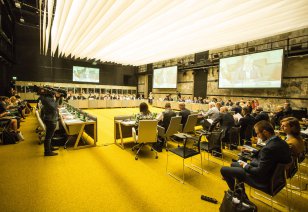Economics, Estonia, EU – Baltic States, Legislation, Markets and Companies
International Internet Magazine. Baltic States news & analytics
Friday, 26.04.2024, 20:28
EU ministers: we must give up economic models burdening the environment
 Print version
Print version |
|---|
One of the
United Nations sustainable development goals for tackling the most pressing
social and environmental challenges is ensuring sustainable consumption and
production patterns. To achieve this, we need to completely overhaul our linear
take-make-waste patterns of production and consumption in favor of a circular
system, where products are designed and marketed with reuse and recycling in
mind, the ministers found.
"If we want to maintain and increase our standard of living, we need fresh thinking and new solutions. This is where eco-innovation comes in. Waste can be a valuable resource, products can be designed to be greener, processes can be smarter and more efficient," Estonia's Environment Minister Siim Kiisler, who chaired the meeting, said according to spokespeople for the Ministry of the Environment.
Eco-innovation
is a priority of the Estonian presidency of the EU Council, shared with the
Trio partners Bulgaria and Austria.
Ministers
exchanged their views in the format of breakout sessions in three important
areas: product transparency, smart cities and financing.
Consumers
can help companies along to a more sustainable production by making informed,
sustainable choices. To do that, they need information about the environmental
footprint of products and services. One possibility would be an information
label that gives the basic ecological footprint parameters for every product.
This would be similar to the mandatory nutritional information label on food
items, which has been very successful in changing the behavior of both
consumers and companies.
Another
topic the discussed by the ministers was sustainable urban environment.
"Currently
about 73 percent of Europeans live in cities, which means increased pressure on
the environment. Today we focused on blue-green infrastructure projects that
can enrich our everyday environment and deliver these future cities as a
standard model. I mean green roofs and facades, open green spaces, constructed
wetlands, restoring streams and rivers, just to name a few. They improve air
quality, reduce urban heat island effect, help manage storm water and increase
biodiversity. It's been proven many times that access to nature makes our lives
better," said Kiisler.
Promoting
eco-innovative solutions means channeling finances into sustainable activities
rather than business-as-usual modes of operation. It is clear that additional
financial resources are needed, whether public, private or a combination of
both.
"Sustainable
financing means valuing environment, economy and society together at once. It's
important to create a system where all three are taken into account. We can't
invest in green solutions just because they are green, they must also be
profitable and useful," Kiisler added.
The Estonian
presidency will continue to work on these issues and hopes to adopt Council
conclusions on eco-innovation at the meeting of the Environmental Council in
December.
The informal
meeting of the ministers of environment will continue on Friday with the focus
on issues of climate change.








 «The Baltic Course» Is Sold and Stays in Business!
«The Baltic Course» Is Sold and Stays in Business!

